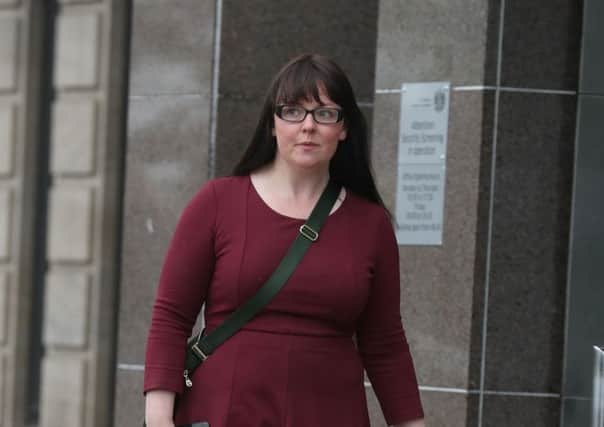Euan McColm: Only spiteful trolls want McGarry behind bars


On Wednesday afternoon, McGarry pleaded guilty to embezzling £25,000 from the Women For Independence campaign group and the Glasgow Regional Association of the SNP. Filmed leaving Glasgow Sheriff Court, alone, McGarry looked rather pathetic. The impulse was to sympathy.
McGarry’s downfall is complete. Surely that’s enough, even for her bitterest enemy?
Advertisement
Hide AdAdvertisement
Hide AdBut in the cesspit of social media, people demanded more. She was the lowest of the low. Not only should she be locked up, the key should be thrown away. Her public fall from grace was not enough, said one contributor to this unpleasant debate, before demanding her immediate imprisonment.
There is every possibility those baying for the disgraced politician to serve time will have their wishes granted. McGarry – who began her crimes before she was elected MP for Glasgow East in 2015 – will, given the nature of the offences, be lucky to avoid prison.
The arguments in favour of this eventuality are, it has to be conceded, reasonably strong. McGarry held positions of trust with both WFI and the SNP regional association. Her betrayal of that trust was calculated and prolonged and if she does go down for it, it may be hard to argue her treatment is unfair.
Depressingly, and entirely predictably, many of those demanding the severest punishment for McGarry’s crimes came from the ranks of those who disagree with her politics. In these bleakly divided days, the destruction of an opponent is to be celebrated.
Nationalists should not dare try to characterise this as evidence of the unique cruelty of the unionist. Had we just witnessed a pro-UK former MP plead guilty to fraud, plenty of independence supporters would be piling on now. Bile is in plentiful supply on both sides of the constitutional divide.
As an MP, McGarry developed a reputation for erratic behaviour. Her propensity for launching into intemperate tirades on Twitter led to her agreeing to pay £10,000 in damages after falsely branding a pro-Union campaigner a Holocaust denier.
Like that friend we all have who’s liable to turn up on the doorstep at 3am with all of their possessions in a bin liner, there’s always been a whiff of the car crash about McGarry.
But no matter how objectionable one might find that recent incarnation of McGarry, revelling in the woes of current incarnation is supremely distasteful. Gleeful hand-clapping is a shameful response.
Advertisement
Hide AdAdvertisement
Hide AdDespite the “concerns” of some online commentators, McGarry can expect no special treatment when, eventually, she is sentenced. Her former comrades in Women For Independence are, however, hopeful that she will avoid jail.
For very good reasons, it’s not for victims of crimes to decide the appropriate punishment for offenders, but I hope WFI’s wish is to be granted. I’m not entirely sure what the benefit to society of McGarry’s imprisonment might be.
I’m not, you understand, suggesting any kind of preferential treatment. In any case where violence or abuse is not involved, prison has to be a last option, surely?
It is now more than seven years since a commission set up by the Scottish Government to look at ways of improving the way women are treated by the criminal justice system called for its “radical reworking” in order to reduce the number of female prisoners in Scotland.
Back then, the chair of the commission, former Lord Advocate Dame Elish Angiolini, said the “significant cost to society” of locking up women suffering from addiction or mental health problems could no longer be ignored.
There was no doubt, she said, that some women had to be imprisoned, both to protect the public and to mark the seriousness of their crimes, but it was time for us to look at the root cause of the problems which led some women to fall into a pattern of low re-offending.
You may feel that McGarry’s crimes are of such a magnitude that their seriousness should be marked by a jail sentence, but nobody would suggest that she poses any kind of danger to the public.
Twenty years ago, then chief inspector of prisons, Clive Fairweather, said that the female prison population should be halved. At the time, there were 200 female prisoners in Scotland.
Advertisement
Hide AdAdvertisement
Hide AdWithin less than a decade, there were more than 400 women behind bars.
Women continue to be imprisoned for what are, in the great scheme of things, fairly minor offences.
Research carried out for the Angiolini Commission, which reported in 2012, suggested that almost all women sentenced to prison in Scotland were suffering either from mental health or addiction problems. Imprisonment, said commission members, reinforced the feelings of low self-worth experienced by inmates.
It was vital, said then justice secretary, Kenny MacAskill, that we found a more effective way of dealing with prisoners.
Seven years later, there has been no reduction in the size of the female prisoner population in Scotland.
I wonder whether the damage caused to many of these women by imprisonment is a price worth paying for the right to see them locked up.
Politicians, whose fine words about improving a prison system that has been repeatedly declared unfit for the needs of female inmates sounded perfectly sincere at the time, have been far too slow to actually do anything about the situation.
With budgets pared back and the criminal justice machine under intense pressure, maybe it’s unsurprising that there has not been the systemic change required to reduce the size of the female prison population. Now would be as good a time as any for MSPs to redouble their efforts.
Advertisement
Hide AdAdvertisement
Hide AdIf Natalie McGarry, the mother of a young child, is sent to prison, she – like many more Scots women convicted of non-violent offences – will be entering into a system that the government knows stands to do her more harm than good.